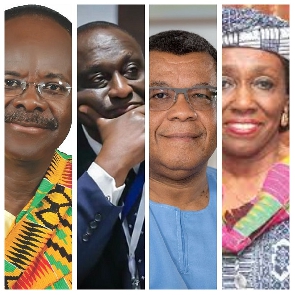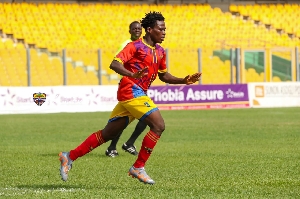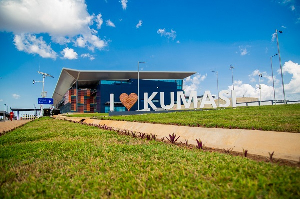Alan John Kwadwo Kyeremanten, a veteran member of the New Patriotic Party (NPP), announced his resignation from the party on Monday, September 25, 2023. Adding to the intrigue, Kyeremanten declared his intention to run as an independent presidential candidate in the upcoming 2024 general election.
His decision, rooted in allegations of electoral irregularities, unfair treatment, and bias during the NPP super delegates' conference, has ignited a nationwide debate about Ghana's entrenched political duopoly and the potential emergence of a third political force.
While Kyeremanten's move has garnered both support and scepticism, it is not the first time Ghanaian politics has witnessed such defections and independent candidacies.
Here, we revisit prominent politicians who ventured beyond their party lines or established their own political entities:
1. Nana Konadu Agyemang Rawlings
The former First Lady and widow of former President Jerry John Rawlings departed from the National Democratic Congress (NDC) in 2012, a party founded by her husband. She went on to make history as Ghana's first female presidential candidate in 2016 when she ran independently. Rawlings' decision to leave the NDC was influenced by her unsuccessful bid in the party's presidential primaries in 2008, leading her to establish the National Democratic Party (NDP) in 2012. However, her NDP garnered only 0.16% of the votes in the 2016 elections.
2. Obed Asamoah
A former Chairman of the NDC, Obed Asamoah resigned from the party in 2006 after a loss in his second bid for the chairmanship. His departure was marked by disagreements with party leaders, citing concerns for his personal safety if he continued within the party. Subsequently, Asamoah, along with other political defectors, founded the Democratic Freedom Party (DFP) in 2006, where he served as the life patron. Nevertheless, Asamoah and the DFP members rejoined the NDC in 2011.
3. Paa Kwesi Nduom
The former presidential candidate for the Convention People's Party (CPP) left the party in 2011 due to conflicts with leading party members. In January 2012, he established the Progressive People's Party (PPP). Despite contesting the 2012 and 2016 elections under the PPP banner, Nduom was unsuccessful on both occasions.
4. Augustus "Goosie" Tanoh
A founding member of the National Democratic Congress party (NDC), Goosie Tanoh, departed from the party in 1999, citing concerns about corruption and disorganization. He founded the National Reform Party (NRP) and ran for president in 2000 but without success. However, Tanoh returned to the NDC in 2007/2008. In 2018, he reentered the NDC presidential race ahead of the 2020 elections.
5. Hassan Ayariga
The 2012 Presidential Candidate of the People's National Convention (PNC), Hassan Ayariga, left the party in 2015 after losing the bid to Dr. Edward Mahama. He cited unfair treatment during the PNC's 2015 congress as the reason for his departure. Ayariga formed the All People's Congress (APC) in 2016 and ran for Ghana's presidency that year, though he was disqualified by the Electoral Commission (EC) for not meeting the presidential aspirant requirements. He also contested in the 2020 elections but secured only 0.05% of the total votes cast.
. Charles Wereko-Brobby
A founding member of the NPP, Charles Wereko-Brobby, known as Tarzan, established the United Ghana Movement (UGM) in 1996 after leaving the NPP due to internal party disagreements. Despite running for president under the UGM banner and receiving only 0.3% of the votes, he eventually returned to the NPP. In 2013, the NPP suspended Dr. Wereko-Brobby from the party following his vocal criticisms.
These political shifts and independent candidacies have punctuated Ghana's political landscape over the years, highlighting the complexities of its multi-party system and the constant pursuit of new avenues for political influence and change.
Ghana’s leading digital news platform, GhanaWeb, in conjunction with the Korle-Bu Teaching Hospital, is embarking on an aggressive campaign which is geared towards ensuring that parliament passes comprehensive legislation to guide organ harvesting, organ donation, and organ transplantation in the country.
NAY/FNOQ
General News of Wednesday, 27 September 2023
Source: www.ghanaweb.com
Alan and six other stalwarts who broke away from their parties
Entertainment
















